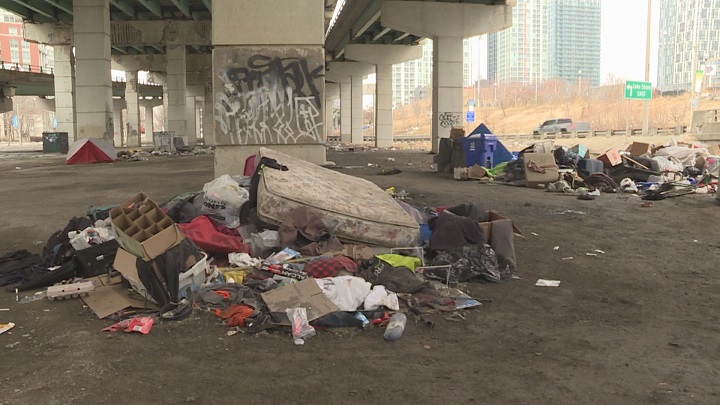Several community groups across Winnipeg are joining forces to find a long-term solution to support the city’s homeless population.

The Winnipeg Strategy to Support Unsheltered People is a 10-year plan with the aim of moving homeless support away from services like Winnipeg police or 311, as well as connecting homeless people with resources.
The plan – which includes input from community groups, public services, the private sector, government, and people with personal experience with homelessness – aims to educate, train and speak out against stigma in the city.
“The 10-year plan hopes to shift our city from managing homelessness through emergency and crisis responses to preventing and ending it through longer-term solutions,” said Kris Clemens of End Homelessness Winnipeg.
Clemens told 680 CJOB that homelessness in Winnipeg is more than just the camps you may see under bridges, and that for every person experiencing typical unsheltered homelessness, there could be up to three people experiencing a type of ‘hidden homelessness’.
“There’s provisionally-housed people that are staying in safe but temporary locations, transitional housing or institutions or staying temporarily with family and friends.”
“Then we have this hidden homelessness, which would be people who are really off the radar, that are difficult to reach,” said Clemens.
The partnership behind the strategy, which came together in summer 2019, is guided by the United Nations’ declaration of housing as a universal human right.

Get weekly health news
Clemens said while mental health problems and addictions are prevalent in the city’s homeless community, they don’t necessarily cause homelessness or vice-versa.
“Of course there’s overlap among individuals experiencing homelessness and mental health and addictions. There’s also overlap between people who have stable housing and experience addiction and mental health issues, so there’s not necessarily a causative or correlative relationship.”
Another local organization is taking matters into its own hands when it comes to providing shelter for homeless people, specifically veterans.
The Urban Knights and Ladies Peace Patrol has set up a pair of warming huts, built by students at Stonewall Collegiate, at the homeless camps on Henry Avenue.
The organization’s founder, Mike Belhumeur, told 680 CJOB he experienced homelessness himself when he left military service, and has been working to help unsheltered Winnipeggers since 1976.
“When I first got out of the service, I was homeless for about a year, so I know what it’s like – I can relate to a lot of the people that are going through that right now.
“We take them care packages, we refer them to resources, and help them file claims so we can get them extra help.”
The two shelters were created as an effort to be more proactive and practical, he said.
“We go out there regularly with care packages and we talk to the homeless. Last year, for example, we found 40 homeless veterans… we thought we’d set up a couple of warming huts, just to get them out of the cold wind, or if something happened to their tent. A little bit more of a solid structure.
“We’re going to use one of them to hand out care packages over the winter. It’s kind of like an early Christmas present.”









Comments